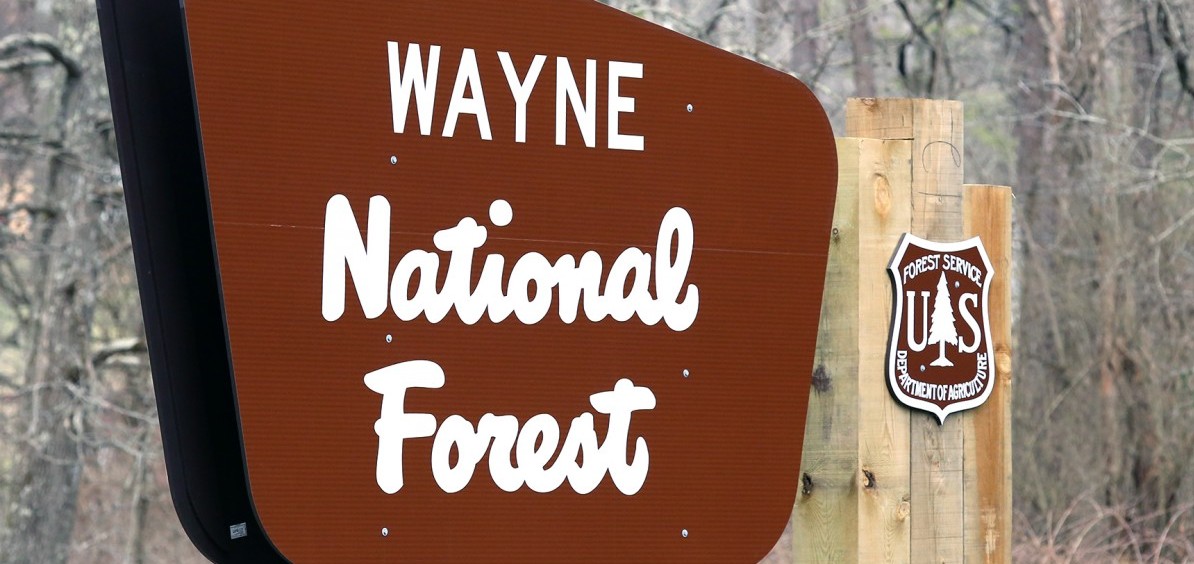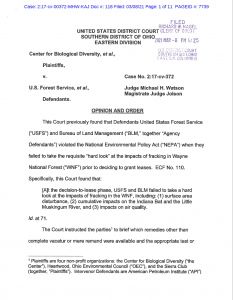News

Judge Halts New Fracking Permits For Wayne National Forest
By: David Forster
Posted on:
ATHENS, Ohio (WOUB) — A federal judge halted the issuing of any new permits for oil and gas drilling in Wayne National Forest.
The order follows a decision by the same judge last year in which he said opening the forest up to leases for oil and gas extraction, or fracking, was based on a flawed environmental analysis.
Environmental groups opposed to drilling in the forest were hoping the judge would completely scrap the environmental analysis. This would have forced the U.S. Forest Service and U.S. Bureau of Land Management to start over from scratch.

Instead, U.S. District Judge Michael Watson decided in his March 8 order to allow the agencies to attempt to salvage the existing analysis.
In the meantime, Watson prohibited any new drilling permits. He also prohibited any water withdrawals from the Little Muskingum River for existing drilling operations and any further surface disturbing activities on the already leased parcels.
Heather Cantino, who for years has been fighting fracking in Wayne National Forest, said it will be difficult for the federal agencies to salvage the existing environmental analysis.
“They have to go back to square one and really look at the impacts because they never have,” she said. “That’s a huge job.”
Cantino is chair of the steering committee for Athens County’s Future Action Network, which formed in 2011 as Athens County Fracking Action Network to oppose plans to lease land for fracking in the forest.
She said that the environmental review, completed in 2012, was built on a 2006 forest management plan that doesn’t address fracking. If the analysis is opened back up for review, she said, the agencies will likely now have to also address how fracking in the forest will affect climate change.
“I think that it’s not just tinkering that’s going to get them approval from the judge,” she said, especially if climate impacts must be addressed.
It’s also unclear how all of this will be affected by an executive order signed by President Joe Biden right after he took office in January that halts any new leases for oil and gas development on federal lands.
WOUB asked the Bureau of Land Management and the Forest Service what steps they plan to take next in response to the judge’s order and the president’s executive order.
The BLM responded with this statement: “At this time, the BLM Eastern States Office is reviewing potential paths forward in regard to supplementing the 2016 Environmental Assessment, including potential timelines, and coordination with the USDA Forest Service regarding consent.”
The Forest Service did not respond to multiple requests for comment.
Watson said in his decision last year that BLM and the Forest Service failed to take a “hard look” at the impacts of fracking in Wayne National Forest, as required under the National Environmental Policy Act.
That decision came in a lawsuit brought against the federal agencies by four environmental groups. Following that decision, these groups argued that the judge should scrap the environmental review and direct the agencies to start over.
In his March 8 order, Watson acknowledged that the usual outcome in cases like this would be to do just that, which would also mean undoing the leases already made and refunding the money paid for them.
But the judge said that courts have made exceptions in cases where the environmental analysis was flawed but fixable. “[T]his is not a situation in which the Agencies completely abandoned their duties under the NEPA,” he wrote.
Watson also said refunding the money paid for the leases is not a simple matter. About half of it went to the state, which is using it to fund schools, roads and bridges. The judge also noted that the company holding the leases has already invested millions of dollars in drilling and well construction.
The environmental groups argued that the company knew the risks going in, including the possibility of litigation given the public opposition to the leases. But the judge was persuaded by the argument that, as he wrote, “some economic harm is concrete, and perhaps irreversible” if the environmental review is vacated and the leases undone, and that this harm extended beyond the company to the surrounding communities.
The leases were made to Eclipse Resources Corp., which has since been merged into Texas-based Southwestern Energy. Southwestern did not respond to multiple requests for comment on the judge’s order and what it plans to do with the leased property pending the revised environmental analysis and the restrictions the judge has put in place in the meantime.

